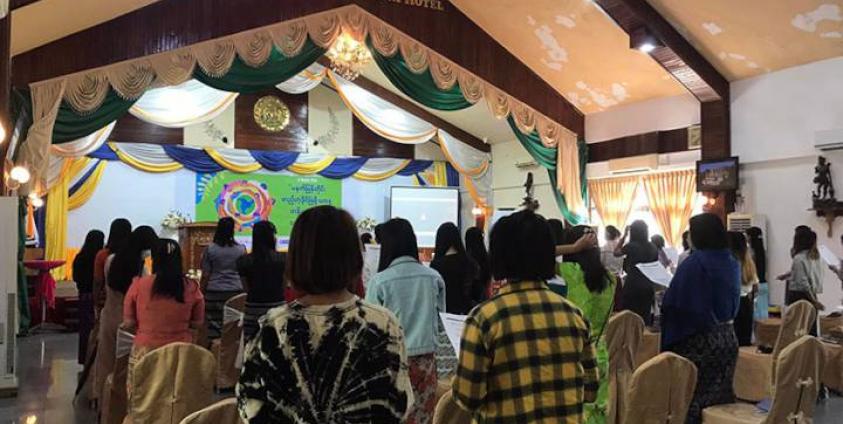Women’s rights activists in Arakan State called for equal rights for women and the elimination of violence and discrimination against women on Tuesday as the world observed International Women’s Day.
Women and children make up the majority among more than 200,000 people displaced by two years of fighting between the Myanmar military and the Arakan Army (AA) in Arakan State from late 2018 to November 2020.
Many have been forced to take shelter at camps for internally displaced persons (IDPs), with attendant emotional insecurities and material deprivations. Some IDPs have returned to their homes over the past year, since the Myanmar military and the AA entered into an unofficial ceasefire in late 2020. But nearly 80,000 IDPs remain at displacement camps.
Ma Kyi Kyi Hla, who has been sheltering at Nyaungchaung IDP camp in Kyauktaw Township, said she feels unsafe at the displacement camp and lacks access to proper healthcare services.
“We are a family of five and all of us are women. So we feel unsafe staying at the camp. We don’t feel safe in many respects, including bathing. We always have to take caution for our safety,” said Ma Kyi Kyi Hla.
Ma Khin Myint Zaw, director of Women Generation, a group engaged in promoting women’s rights, said temporary buildings at IDP camps are crumbling away as they were built some three years ago, and women feel increasingly unsafe as a result. They are losing their fundamental rights and suffering from emotional insecurity, she added.
“Women must have their feminine privacy. Personal security is extremely important for them in even bathing and using the toilet. They lost their privacy after they arrived at IDP camps,” said Ma Khin Myint Zaw.
Women were also among the victims killed by artillery strikes and explosions of mines and explosive remnants of war (ERWs) during the fighting in Arakan State. Other women lost limbs or were otherwise injured.
On the legal front, some women have been arrested on suspicion of having ties to the AA, and at least 10 women were charged under the Counter-Terrorism Law in relation to alleged links to the ethnic armed group.
Women are vulnerable to multiple forms of violence during armed conflicts, said Saw San Nyein Thu, chairwoman of the Rakhine Pioneer Women’s Group.
“They were subjected to various kinds of violence during the conflict period. For example, they were raped and suffered from other forms of sexual harassment. And they have also suffered from the consequences of political instability in the region,” she said.
The majority of women in Arakan State remain in traditional roles as housewives due to typically lower educational levels compared with men, as well as job scarcity and poverty in the region. And armed conflict has robbed many women of potential opportunities.
“Girls do not have access to higher education. Everything is out of reach for them. Women in Arakan State have been lacking in many things after being hit by war,” said Daw Nyo Aye, chairwoman of the Rakhine Women Network.







